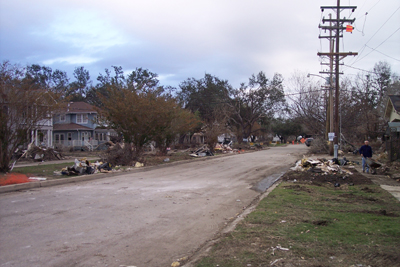
A street in the Lakeview district
New Orleans: The City
That America Forgot(continued)
By Lance Cutler
If you drive long enough, you'll pass through Lakeview into Gentilly, New Orleans' very first suburb built in the 1940s and 1950s. Gentilly was the site of the first shopping center in New Orleans and the first Howard Johnson's when that meant something. Now, busted out windows in house after house bear silent witness where Natal's nightclub used to pound with music and clinking ice cubes and whispered promises. Where the famous McKenzie's Bakery got its start, upended trees lie like fallen soldiers on the battleground. What was the still lovely, mixed working-class neighborhood of Gentilly is now empty, deserted, covered in mud and carrying a lingering stench of rotten seafood, putrid chicken and decaying beef.
If you hop up onto the I-10, as the locals call it, you enter New Orleans East. First settled by Gentilly residents displaced by the Interstate Highway, New Orleans East is full of apartments, strip malls, fast-food joints and shopping centers. The Sam's alongside the Interstate is gutted, and so is the Target and the Home Depot. In the parking lot, rows of trailers wait to be distributed by FEMA, next to the huge white tents where volunteers still give out water and food and clothes.
New Orleans East was a predominantly black neighborhood, but mixed economically. New Orleans Saints players and famous musicians like Aaron Neville lived in the gorgeous giant houses. Lovely neighborhoods with golf courses sprung up to handle the affluent folks leaving the Ninth Ward, and all sorts of working people lived in the inexpensive apartment buildings.
But not now. Now, no one lives in New Orleans East. The Golden Arches have been bent into broken shards. The Sam's sign slammed into a building and lies shattered. Flooded cars covered with mud hang precipitously over the canals. There are no street lights, stop lights or electric lights of any kind. At night, New Orleans East is dark and empty, and the sheer vastness of that darkness is frightening.
Slipping over to Highway 11 that crosses Lake Ponchartrain, you come to Slidell, once a simple fishing community in St. Tammany Parish. The extraordinary jazz duo, Kim Prevost and her husband Bill Solley, live in Slidell. They purchased their house at 1706 Dunkirk Street in the new King's Point subdivision, because housing in Slidell was cheaper than in New Orleans and they thought the environment would be better for their daughter, Sofia.
Slidell is 33 miles due east of Jacques Soulas's house, 33 miles of complete devastation. When Bill and Kim made the long drive from Houston, they knew they would find storm damage, but they hoped that water had not invaded their home. Nearing their subdivision, they saw hundreds of large pines lying on the ground, their trunks snapped like matchsticks. Telephone poles had tumbled, taking power with them. Lower Slidell left them speechless. It looked like a huge bomb had gone off, blowing houses off their foundations, ripping walls off buildings so they looked like doll houses waiting to be furnished. Fishing camps along the lake were completely wiped out, leaving only row after row of dock pilings as a marker.
As they turned onto their block, the destruction continued. Trees that had crushed cars and slammed into houses were now strewn about. The water was long gone, leaving mud and dead grass and the piles of personal possessions dragged from the homes. The landscape seemed washed of color and life until it was a faded black and white memory, only it wasn't a memory. It was real.
From the outside, their home looked intact and their dwindling hopes were rekindled. The orange "X" left by the search and rescue teams on their garage door unnerved them. Bill took out his key and went through the front door, while Kim made her way through the snapped trees and the muddy yard toward the bashed in back door.
Bill's first thought upon entering the house was to just shut the door and leave. The floor was slick with mud, the walls covered with black blotches of mold and permeated by that smell. That smell of rotting food, the smell that seeped into your brain and fouled everything you tried to eat for the next week. Sodden furniture sat throughout the house as if left by maniacal movers. The refrigerator stood open in the living room, the couch rested in the kitchen, the dining table squeezed into a bathroom.
Meanwhile Kim stood in the kitchen staring at the mud lines five feet
high around her walls. Mud was everywhere; covering Sofia's toys, covering
the toy stove where she had spent night after night playing with her
daughter pretending to make red beans and rice, and chicken-andouille
gumbo, and black-eyed peas, and that's when she lost it and began to
cry. She cried because she realized those special moments wouldn't occur
again. She cried at the mud in Sofia's broken crib, the one that Kim's
mother had purchased. She cried for the destroyed recording studio,
for the microphones, the pre-amps, the wrecked Rolling 1880 Digital
Recording System she and Bill used to record their scintillating jazz
music.